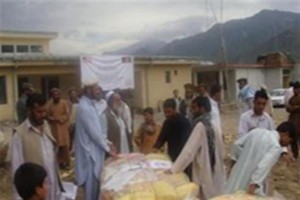
Community leaders distributed bedding to refugee families now living in Kunar Province’s Sholtan Valley.
USAID/LGCD
Afghan Government and USAID distributed essential household items to 630 families in the Sholtan Valley.
23 SEPTEMBER 2010 | KUNAR PROVINCE, AFGHANISTAN
Since 2008, ongoing violence in the Bajaur region of Pakistan has caused scores of Pakistani families to seek refuge in Afghanistan. Many of these displaced families have settled in Kunar Province’s Sholtan Valley, joining Afghans returning home from decades spent as refugees in Pakistan. Approximately 630 of these displaced and refugee families are living in Shigal District, with more arriving each month. Most of these families do not have the basic household goods that are essential for day-to-day living.
Responding to Shigal District Governor Haji Abdul Zahir’s call for support to these vulnerable families, USAID’s Local Governance and Community Development (LGCD) program worked with the District Development Assembly and the Department of Refugees and Repatriation (DoRR) to meet the families’ most urgent non-food needs. LGCD partnered with local officials, community leaders, the DoRR, and the Afghan Red Crescent Society to identify families in need and to procure basic kitchen, bedroom, and hygiene kits.
Despite significant security threats, including an attack on the District Center where the supplies were stored, District Governor Zahir helped to unload the trucks and personally distribute kitchen kits containing basic cooking tools. One refugee from Pakistan, Mr. Sifatullah, thanked the District Governor and USAID, saying, “We were unable to bring all the things we need in our daily lives; we only saved ourselves from death. We are very pleased with the Government of Afghanistan, which always helps us and provides for our basic needs.”
The government’s commitment to addressing community needs, and the community’s willingness to engage local government institutions through a participatory decision-making process, resulted in the successful distribution of aid and fostered a closer relationship between the community and government. Through LGCD, USAID is helping to connect communities and their local government bodies – a crucial step toward increasing the legitimacy of the Afghan Government and improving stability.”







Comment
Make a general inquiry or suggest an improvement.